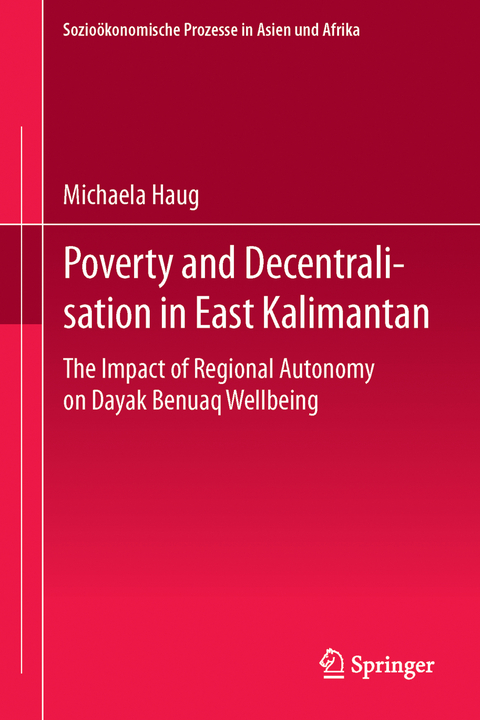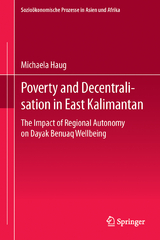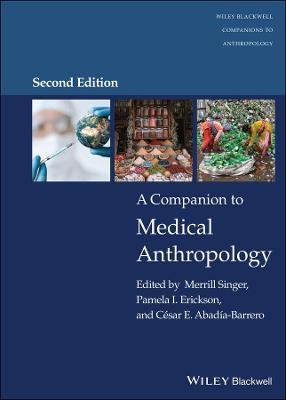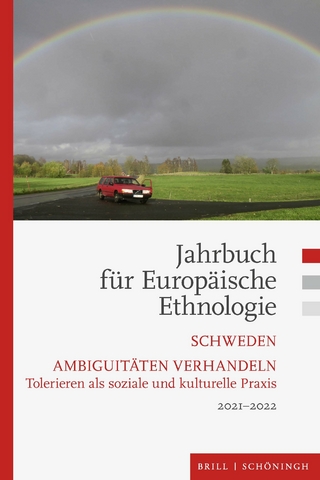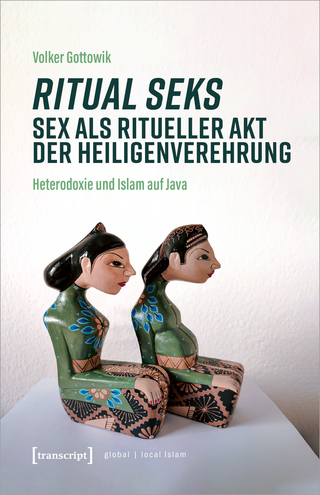Poverty and Decentralisation in East Kalimantan
The Impact of Regional Autonomy on Dayak Benuaq Wellbeing
2015
|
2010
Springer Fachmedien Wiesbaden GmbH (Verlag)
978-3-8255-0770-1 (ISBN)
Springer Fachmedien Wiesbaden GmbH (Verlag)
978-3-8255-0770-1 (ISBN)
With the implementation of regional autonomy Indonesia passed one of the most rigorous decentralisation reforms throughout Asia. This book explores the impacts regional autonomy had on the wellbeing of the Dayak Benuaq - one of the diverse indigenous groups of East Kalimantan. It describes the Dayak Benuaq’s own perceptions of poverty and wellbeing, documents processes of ongoing social, political and economic change and demonstrates how they are intertwined with decentralisation.
With the implementation of regional autonomy Indonesia passed one of the most rigorous decentralisation reforms throughout Asia. These far reaching reforms generated a variety of new opportunities in East Kalimantan, but with high costs in the social and natural environments.
This book explores the impacts regional autonomy had on the wellbeing of the Dayak Benuaq - one of the diverse indigenous groups of East Kalimantan. It describes the Dayak Benuaq’s own perceptions of poverty and wellbeing, documents processes of ongoing social, political and economic change and demonstrates how they are intertwined with decentralisation. The ethnographic case studies of three Dayak Benuaq villages in the district West Kutai question the link between decentralisation and poverty and show that decentralisation is not – as often assumed – automatically pro poor. Instead, it is shown that it is the respective bargaining power of local actors which determines the outcomes of decentralisation and who benefits and who doesn’t.
Introducing a newly developed model to capture the multidimensionality of poverty and the trade-offs among the different aspects of wellbeing this study contributes to research on poverty and wellbeing. It further provides insights into the local dimensions of decentralisation and contributes to a better understanding of recent processes of socioeconomic change in Borneo.
This case study offers valuable insights into questions of importance to scholars as well as policy makers concerned with poverty and the impacts of decentralisation on local livelihoods.
With the implementation of regional autonomy Indonesia passed one of the most rigorous decentralisation reforms throughout Asia. These far reaching reforms generated a variety of new opportunities in East Kalimantan, but with high costs in the social and natural environments.
This book explores the impacts regional autonomy had on the wellbeing of the Dayak Benuaq - one of the diverse indigenous groups of East Kalimantan. It describes the Dayak Benuaq’s own perceptions of poverty and wellbeing, documents processes of ongoing social, political and economic change and demonstrates how they are intertwined with decentralisation. The ethnographic case studies of three Dayak Benuaq villages in the district West Kutai question the link between decentralisation and poverty and show that decentralisation is not – as often assumed – automatically pro poor. Instead, it is shown that it is the respective bargaining power of local actors which determines the outcomes of decentralisation and who benefits and who doesn’t.
Introducing a newly developed model to capture the multidimensionality of poverty and the trade-offs among the different aspects of wellbeing this study contributes to research on poverty and wellbeing. It further provides insights into the local dimensions of decentralisation and contributes to a better understanding of recent processes of socioeconomic change in Borneo.
This case study offers valuable insights into questions of importance to scholars as well as policy makers concerned with poverty and the impacts of decentralisation on local livelihoods.
Die Autorin absolvierte ein Studium der Ethnologie, Kunstgeschichte, Malaiologie und Philosophie an den Universitäten Köln, Karlsruhe und der Universitas Gadjah Mada, Yogyakarta. Bis 2006 war sie Wissenschaftliche Mitarbeiterin am Institut für Völkerkunde, Freiburg im Rahmen des interdisziplinären Forschungsprojekts Making Local Government more Resposive to the Poor: Developing Indicators and Tools to Support Sustainable Livelihood under Decentralisation durchgeführt von CIFOR (Centre for International Forestry Research) in Zusammenarbeit mit dem Institut für Forst- und Umweltpolitik und dem Institut für Völkerkunde der Universität Freiburg. Derzeit ist sie Wissenschaftliche Mitarbeiterin am Institut für Ethnologie, Universität zu Köln
| Erscheint lt. Verlag | 18.2.2015 |
|---|---|
| Reihe/Serie | Edition Centaurus - Sozioökonomische Prozesse in Asien, Afrika und Lateinamerika |
| Verlagsort | Herbolzheim |
| Sprache | englisch |
| Maße | 155 x 235 mm |
| Gewicht | 395 g |
| Themenwelt | Sozialwissenschaften ► Ethnologie ► Völkerkunde (Naturvölker) |
| Sozialwissenschaften ► Politik / Verwaltung | |
| Sozialwissenschaften ► Soziologie ► Spezielle Soziologien | |
| Schlagworte | Area Studies • Armut • Armut / Arme • Borneo; Völkerkunde • Dayak Benuaq • decentralisation • East Kalimantan • Poverty • regional autonomy • Wellbeing |
| ISBN-10 | 3-8255-0770-X / 382550770X |
| ISBN-13 | 978-3-8255-0770-1 / 9783825507701 |
| Zustand | Neuware |
| Haben Sie eine Frage zum Produkt? |
Mehr entdecken
aus dem Bereich
aus dem Bereich
Schweden : Ambiguitäten verhandeln - Tolerieren als soziale und …
Buch | Softcover (2023)
Brill Schöningh (Verlag)
49,90 €
Buch | Softcover (2023)
transcript (Verlag)
54,00 €
